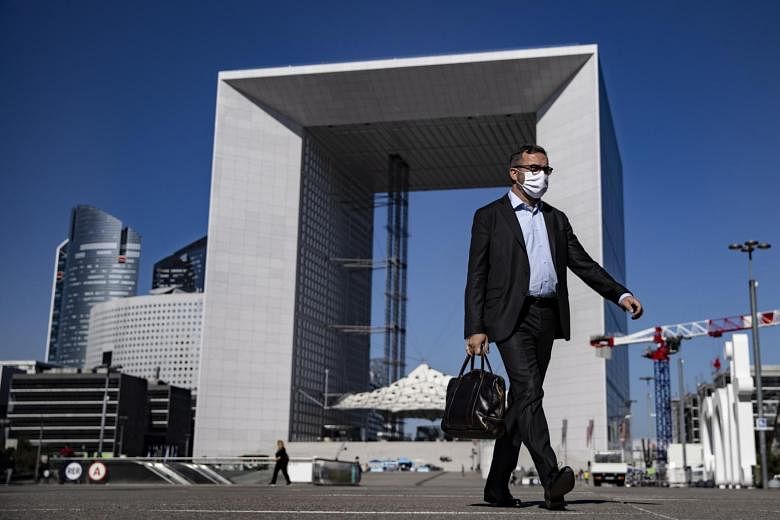LONDON - French President Emmanuel Macron will unveil on Thursday (Sept 3) details of a much-hyped national stimulus plan for his country, in the wake of the coronavirus pandemic which has plunged the French economy into its deepest recession since World War II.
The release of details of the new plan is timed to coincide with the week during which the French traditionally return to work from their August summer holidays.
But the plan is also designed to map out the policies Mr Macron will pursue for the remainder of his presidential term, which expires in May 2022.
Mr Macron insists that the proposals, grandly entitled "France Relaunched", should not be seen as "a strategy to face the difficulty of the moment".
As he told journalists in Paris, the French government has already dealt with present difficulties by unveiling schemes to support companies through the health crisis, and offering to pay the salaries of workers who would otherwise be rendered unemployed.
"France has never before put such a package", claims Mr Macron, and statistics bear him out: the extra spending which his government rolled out already totalled €460 billion (S$747 billion).
The "France Relaunched" programme is meant to secure the future; it is, as Mr Macron put it, "not simply a strategy to respond to the consequences of the crisis, but one designed to ensure how our country can emerge stronger".
The broad outlines of the plan have already been trailed by the president on several occasions. Mr Macron intends to put aside about a fifth of the €100 billion in cash allocated in the plan to "prepare France for 2030" by encouraging foreign manufacturers to set up factories in the country, or for French manufacturers to return to producing goods on home soil.
This reaffirms a theme many French officials are now emphasising: the belief that the longer-term effects of the pandemic would encourage manufacturers to shorten their global supply lines, and that France can benefit from this anticipated process of "repatriating" production links.
The French president aims to make his country more attractive by emphasising in the plan up to thirty different measures which include everything from the promotion of a more modern tax service to a more flexible policy of hiring and firing employees, one of the biggest hurdles for current investors in France.
"We have profoundly transformed the taxation of capital and therefore investment in France, profoundly reformed the labour market which allows hiring, and fundamentally reformed also the apprenticeship sector," Mr Macron claimed last week during a tour of a French pharmaceutical company which decided to expand its home manufacturing base, rather than move production overseas.
However, it remains to be seen whether his latest proposals are adequate to deal with his country's mounting economic problems.
Although most French business leaders praise their government for keeping unemployment down during the health emergency, the estimate is that up to 600,000 jobs were lost in France in the first half of this year, according to statistics compiled by the National Institute for Statistics and Economic Studies.
So projections are that France will still experience soaring unemployment rates, with figures rising from 8.4 per cent before the health crisis struck, to 11 per cent by the end of this year.
Mr Macron's promise to simplify labour legislation should help companies rehire workers once the crisis is over. But many companies also nurse huge corporate debts, so they may be reluctant to take on new employees.
And the history of France is littered with failed promises to relax labour regulation, which get rejected by the county's powerful trade unions.
The French President vows that this time, matters will be different, and that his promised reforms will be implemented. "I was elected for five years, and I owe it to the French to be on the job for five years," he told journalists.
The snag is that Mr Macron's list of promised reforms is growing, and most of them are both unpopular and unfulfilled. Chief among them is a deeply controversial reform of the pension system.
Nor are matters helped by this week's big surge in coronavirus infections, which have risen to their highest levels since March, with even worse infection rates anticipated as people return to work and schools reopen throughout France this week.
Still, Mr Jean Castex, the prime minister appointed by Mr Macron just before the August holidays in a bid to relaunch his administration, was probably closer to reality when he recently warned that France's worsening economic and social crisis would, over time, be "much more dangerous than the health crisis".


